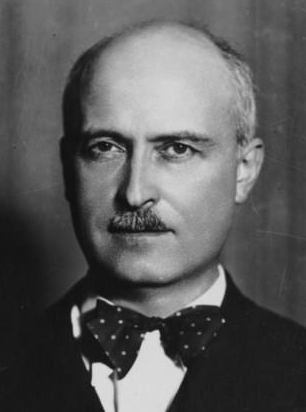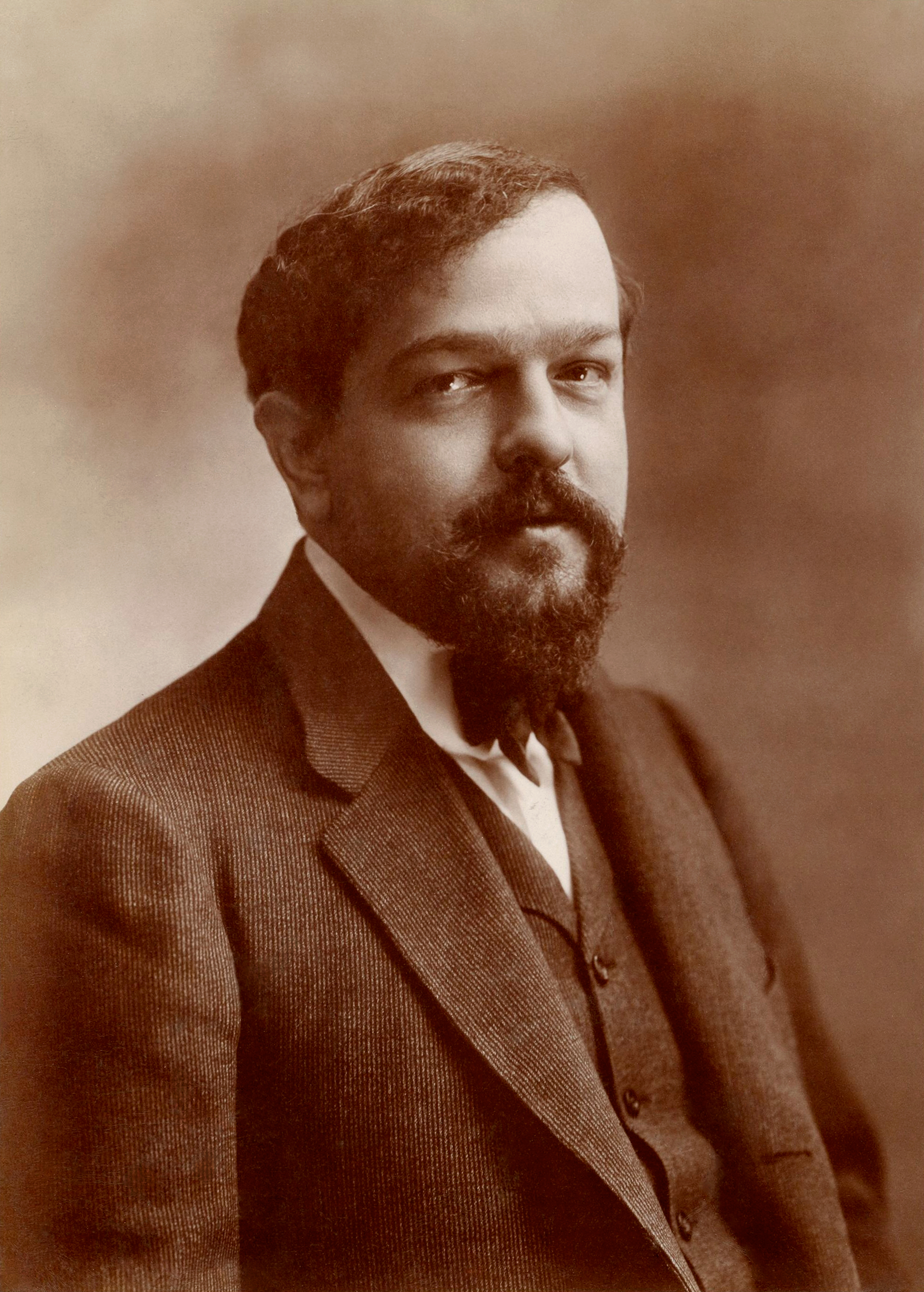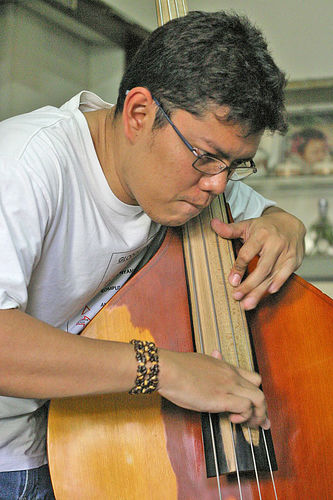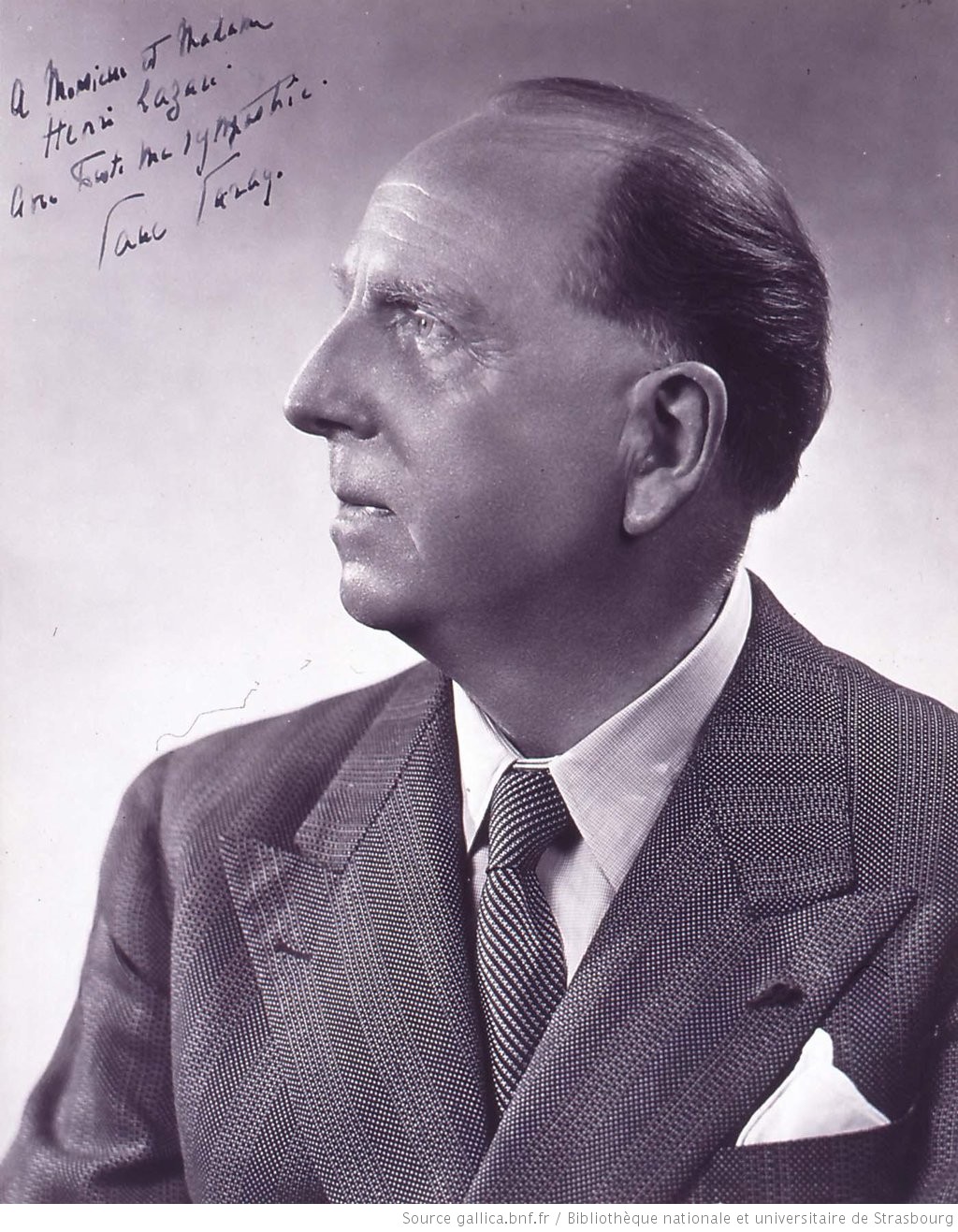|
Escales (Ibert)
("Ports of Call") is a three-movement orchestral suite by Jacques Ibert. The music was inspired by several voyages the composer made in the years after the First World War. He did not originally give the three movements geographical titles, but they are now customarily headed "Rome– Palerme", "Tunis– Nefta" and "Valencia". was an immediate success when premiered in Paris in 1924 and has remained one of Ibert's most popular works. Background After distinguished naval service in the First World War – winning the Croix de Guerre and the Legion of HonourNichols, p. 6 – Jacques Ibert resumed his interrupted musical career. In 1919 he sat for the Prix de Rome, France's most prestigious musical prize, and won it at the first attempt. The prize brought with it two or three years' residence in and study at the Villa Medici, the French Academy in Rome. Students were required to submit their new compositions to the Paris Conservatoire; Ibert's first submission from Rome was a sombr ... [...More Info...] [...Related Items...] OR: [Wikipedia] [Google] [Baidu] |
Jacques Ibert
Jacques François Antoine Marie Ibert (15 August 1890 – 5 February 1962) was a French composer of 20th-century classical music, classical music. Having studied music from an early age, he studied at the Conservatoire de Paris, Paris Conservatoire and won its top prize, the Prix de Rome at his first attempt, despite studies interrupted by his service in World War I. Ibert pursued a successful composing career, writing (sometimes in collaboration with other composers) seven operas, five ballets, incidental music for plays and films, works for piano solo, choral works, and chamber music. He is probably best remembered for his orchestral works including ''Divertissement (Ibert), Divertissement'' (1930) and ''Escales (Ibert), Escales'' (1922). As a composer, Ibert did not attach himself to any of the prevalent genres of music of his time, and has been described as an eclectic. This is seen even in his best-known pieces: ''Divertissement'' for small orchestra is lighthearted, even fri ... [...More Info...] [...Related Items...] OR: [Wikipedia] [Google] [Baidu] |
Debussy
Achille Claude Debussy (; 22 August 1862 – 25 March 1918) was a French composer. He is sometimes seen as the first Impressionism in music, Impressionist composer, although he vigorously rejected the term. He was among the most influential composers of the late 19th and early 20th centuries. Born to a family of modest means and little cultural involvement, Debussy showed enough musical talent to be admitted at the age of ten to France's leading music college, the Conservatoire de Paris. He originally studied the piano, but found his vocation in innovative composition, despite the disapproval of the Conservatoire's conservative professors. He took many years to develop his mature style, and was nearly 40 when he achieved international fame in 1902 with the only opera he completed, ''Pelléas et Mélisande (opera), Pelléas et Mélisande''. Debussy's orchestral works include ''Prélude à l'après-midi d'un faune'' (1894), ''Nocturnes (Debussy), Nocturnes'' (1897–1899 ... [...More Info...] [...Related Items...] OR: [Wikipedia] [Google] [Baidu] |
Pizzicato
Pizzicato (, ; translated as 'pinched', and sometimes roughly as 'plucked') is a playing technique that involves plucking the strings of a string instrument. The exact technique varies somewhat depending on the type of instrument: * On bowed string instruments it is a method of playing by plucking the strings with the fingers, rather than using the bow. This produces a very different sound from bowing, short and percussive rather than sustained. * On keyboard string instruments, such as the piano, pizzicato may be employed (although rarely seen in traditional repertoire, this technique has been normalized in contemporary music, with ample examples by George Crumb, Tōru Takemitsu, Helmut Lachenmann, and others) as one of the variety of techniques involving direct manipulation of the strings known collectively as " string piano". * On the guitar, it is a muted form of plucking, which bears an audible resemblance to pizzicato on a bowed string instrument with its relatively ... [...More Info...] [...Related Items...] OR: [Wikipedia] [Google] [Baidu] |
Nefta
Nefta (or Nafta; ) is a Tunisian municipality and an oasis in Tozeur Governorate north of the Chott el Djerid. Religious significance Nefta is considered by most Sufis to be the spiritual home of Sufism, a mystical branch of Islam; many religious buildings are located in the district El Bayadha. Nefta is a pilgrimage center to which pilgrims travel throughout the year. There is a Folk Festival in April and a Date Festival in November/December. Nefta is the religious center of the Bled el Djerid, the "Land of Palms", with more than 24 mosques and 100 marabouts. The marabouts still attract pilgrims from all over southern Tunisia and even from Algeria. This great veneration of the marabouts reflects the continuing vigor of Sufism, the movement which grew up in the 12th century around Sufi Abu Madian (d. 1197). The name of the Sufis came from the simple woolen garment (suf) they wore. They believed that the adherents of Islam, a religion of the desert, should show particular mo ... [...More Info...] [...Related Items...] OR: [Wikipedia] [Google] [Baidu] |
Ostinato
In music, an ostinato (; derived from the Italian word for ''stubborn'', compare English ''obstinate'') is a motif or phrase that persistently repeats in the same musical voice, frequently in the same pitch. Well-known ostinato-based pieces include classical compositions such as Ravel's ''Boléro'' and the '' Carol of the Bells'', and popular songs such as John Lennon’s “Mind Games” (1973), Donna Summer and Giorgio Moroder's " I Feel Love" (1977), Henry Mancini's theme from ''Peter Gunn'' (1959), The Who's " Baba O'Riley" (1971), The Verve's " Bitter Sweet Symphony" (1997), and Flo Rida's " Low" (2007). Both ''ostinatos'' and ''ostinati'' are accepted English plural forms, the latter reflecting the word's Italian etymology. The repeating idea may be a rhythmic pattern, part of a tune, or a complete melody in itself. Kamien, Roger (1258). ''Music: An Appreciation'', p. 611. . Strictly speaking, ostinati should have exact repetition, but in common usage, the term cover ... [...More Info...] [...Related Items...] OR: [Wikipedia] [Google] [Baidu] |
IMSLP
The International Music Score Library Project (IMSLP), also known as the Petrucci Music Library after publisher Ottaviano Petrucci, is a subscription-based digital library of public domain, public-domain sheet music, music scores. The project uses MediaWiki software, and has uploaded more than 736,000 scores and 80,700 recordings by 1,900 performers of more than 226,000 works by 27,400 composers. IMSLP has both an App Store (Apple), iOS app and an Android (operating system)#Applications, Android app. History Overview The site was launched on February 16, 2006. The library consists mainly of image scanner, scans of old musical editions out of copyright. In addition, it admits scores by contemporary composers who wish to share their music with the world by releasing it under a Creative Commons license. One of the main projects of the IMSLP was the sorting and uploading of the complete works of Johann Sebastian Bach in the Bach Gesellschaft, Bach-Gesellschaft Ausgabe (1851–99), a ... [...More Info...] [...Related Items...] OR: [Wikipedia] [Google] [Baidu] |
Ottorino Respighi
Ottorino Respighi ( , , ; 9 July 187918 April 1936) was an Italian composer, violinist, teacher, and musicologist and one of the leading Italian composers of the early 20th century. List of compositions by Ottorino Respighi, His compositions range over List of operas by Ottorino Respighi, operas, ballets, orchestral suites, choral songs, chamber music, and transcriptions of Italian compositions of the 16th–18th centuries, but his best known and most performed works are his three orchestral tone poems which brought him international fame: ''Fountains of Rome (symphonic poem), Fountains of Rome'' (1916), ''Pines of Rome'' (1924), and ''Roman Festivals (Respighi), Roman Festivals'' (1928). Respighi was born in Bologna to a musical and artistic family. He was encouraged by his father to pursue music at a young age, and took formal tuition in the violin and piano. In 1891, he enrolled at the Conservatorio Giovanni Battista Martini, Liceo Musicale di Bologna, where he studied the vi ... [...More Info...] [...Related Items...] OR: [Wikipedia] [Google] [Baidu] |
Joaquín Turina
Joaquín Turina Pérez (9 December 188214 January 1949) was a Spanish composer of classical music.''Encyclopædia Britannica'' online (2014)"Joaquín Turina"/ref> Biography Turina was born in Seville. He studied in Seville as well as in Madrid. He lived in Paris from 1905 to 1914 where he took composition lessons from Vincent d'Indy at the Schola Cantorum de Paris and studied the piano under Moritz Moszkowski. Like his countryman and friend, Manuel de Falla, while in Paris he familiarized himself with the impressionist composers Maurice Ravel and Claude Debussy, whose music had a profound influence on his compositional practice. Marco, Tomás (1993)''Spanish Music in the Twentieth Century'' pp. 36–44. Harvard University Press On 10 December 1908 he married Obdulia Garzón and together they had five children. She was the dedicatee of the '' Danzas fantásticas,'' which he completed in 1919. Along with Falla, he returned to Madrid in 1914, working as a composer, teacher a ... [...More Info...] [...Related Items...] OR: [Wikipedia] [Google] [Baidu] |
The Musical Times
''The Musical Times'' was an academic journal of classical music edited and produced in the United Kingdom. It was originally created by Joseph Mainzer in 1842 as ''Mainzer's Musical Times and Singing Circular'', but in 1844 he sold it to Alfred Novello (who also founded '' The Musical World'' in 1836), and it was published monthly by Novello and Co. (also owned by Alfred Novello at the time). It first appeared as ''The Musical Times and Singing Class Circular'', a name which was retained until 1903. From the very beginning, every issue – initially just eight pages – contained a simple piece of choral music (alternating secular and sacred), which choral society members subscribed to collectively for the sake of the music. Its title was shortened to its present name from January 1904. Even during World War II it continued to be published regularly, making it the world's oldest continuously published periodical devoted to western classical music. In 1947 a two volume compila ... [...More Info...] [...Related Items...] OR: [Wikipedia] [Google] [Baidu] |
Hamilton Harty
Sir Herbert Hamilton Harty (4 December 1879 – 19 February 1941) was an Irish composer, conductor, pianist and organist. After an early career as a church organist in his native Ireland, Harty moved to London at about age 20, soon becoming a well-known piano accompanist. ''The Musical Times'' called him "the prince of accompanists". As a composer he wrote throughout his career, many of his works being well received, though few are regularly performed in the 21st century. In his career as a conductor, which began in 1904, Harty was particularly noted as an interpreter of the music of Berlioz. From 1920 to 1933 he was the chief conductor of the Hallé Orchestra in Manchester, which he returned to the high standards and critical acclaim that it had enjoyed under its founder, Charles Hallé. His last permanent post was with the London Symphony Orchestra, but it lasted only two years, from 1932 to 1934. During his conducting career, Harty made some recordings with his orchestr ... [...More Info...] [...Related Items...] OR: [Wikipedia] [Google] [Baidu] |
Le Figaro
() is a French daily morning newspaper founded in 1826. It was named after Figaro, a character in several plays by polymath Pierre Beaumarchais, Beaumarchais (1732–1799): ''Le Barbier de Séville'', ''The Guilty Mother, La Mère coupable'', and the eponym, eponymous ''The Marriage of Figaro (play), Le Mariage de Figaro''. One of his lines became the paper's motto: "Without the freedom to criticise, there is no flattering praise". The oldest national newspaper in France, is considered a French newspaper of record, along with and ''Libération''. Since 2004, the newspaper has been owned by Dassault Group. Its editorial director has been Alexis Brézet since 2012. ''Le Figaro'' is the second-largest national newspaper in France, after ''Le Monde''. It has a Centre-right politics, centre-right editorial stance and is headquartered on Boulevard Haussmann in the 9th arrondissement of Paris. Other Groupe Figaro publications include ''Le Figaro Magazine'', ''TV Magazine'' and ''Eve ... [...More Info...] [...Related Items...] OR: [Wikipedia] [Google] [Baidu] |
Paul Paray
Paul Marie-Adolphe Charles Paray (French: [pɔl paʁɛ]; 24 May 1886 – 10 October 1979) was a French conductor, organist and composer. After winning France's top musical award, the Prix de Rome, he fought in the First World War and was a prisoner of war for nearly four years. He held a succession of chief conductorships, including those of the Lamoureux Orchestra, Lamoureux and Colonne Orchestra, Colonne Orchestras in Paris and the Monte-Carlo Philharmonic Orchestra in Monaco. For ten years from 1952 he was chief conductor of the Detroit Symphony Orchestra, with which he made a celebrated series of recordings for Mercury Records#Mercury Living Presence series, Mercury Records' "Living Presence" series, many of which have been digitally released in the 21st century. Life and career Early years Paul Paray was born in Le Tréport, Normandy, on 10 October 1886,Goodwin, Noë"Paray, Paul" ''Grove Music Online'', Oxford University Press, 2011 , the second son and youngest of three chil ... [...More Info...] [...Related Items...] OR: [Wikipedia] [Google] [Baidu] |






